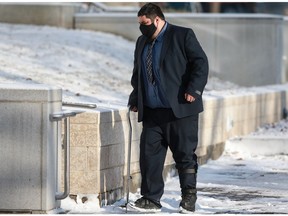In a 5-4 ruling, the SCC agreed that Braydon Wolfe’s 10-year driving ban wasn’t an available sentencing option under the Criminal Code.

The Supreme Court of Canada has set aside Braydon Wolfe’s 10-year driving ban after the Saskatchewan man caused a deadly highway crash near Langham seven years ago.
The majority decision means Wolfe can operate a motor vehicle after he is released from prison.
During his judge-alone trial at Saskatoon Court of King’s Bench, court heard Wolfe was driving up to 106 km/hr on the wrong side of Highway 16 — a divided highway — when he crashed head-on into a car carrying Mohammad Kazem, his wife Sangin Niazi and their 24-year-old daughter, Zohal Niazi.
Driving offences under the Criminal Code of Canada were overhauled when Bill C-46 was passed in 2018, and included the addition of a discretionary driving prohibition order.
Section 320.24(4) of the code states:
“If an offender is found guilty of an offence under section 320.13, subsection 320.14(2) or (3), 320.15(2) or (3) or under any of sections 320.16 to 320.18, the court that sentences the offender may, in addition to any other punishment that may be imposed for that offence, make an order prohibiting the offender from operating the type of conveyance in question during a period to be determined in accordance with subsection (5).”
The “enumerated” or listed offences don’t include criminal negligence causing death, but do include dangerous driving causing death.
In the Supreme Court’s 5-4 ruling, the majority of judges disagreed.
“(Wolfe) was not ‘found guilty’ of an enumerated offence within the meaning of that provision. Accordingly, discretionary driving prohibitions were not available as a sentencing option,” Justice Sheilah Martin ruled; Chief Justice Richard Wagner and Justices Andromache Karakatsanis, Malcolm Rowe and Michelle O’Bonsawin concurred.
In a dissenting opinion, Justice Mary Moreau wrote that she would have dismissed the appeal. Justices Suzanne Côté, Mahmud Jamal and Nicholas Kasirer agreed with her.
They concluded that the interpretation of the code gives sentencing judges authority to impose discretionary driving bans when someone is specifically found guilty of criminal negligence causing death while driving.
“A conviction under ss. 220 or 221 (where that conviction arises from criminal conduct involving the operation of a conveyance) necessarily entails a finding of guilt for dangerous operation causing death or bodily harm by operation of s. 662(5), which provides the basis for the imposition of a driving prohibition order under s. 320.24(4),” the dissenting judges concluded.
“This interpretation is most consistent with a harmonious reading of the text of s. 320.24(4), its broader context, and the objects of the law within the legislative scheme as a whole, and avoids absurd consequences that are presumed not to have been intended by Parliament.”
The Saskatoon Star Phoenix has created an Afternoon Headlines newsletter that can be delivered daily to your inbox so you are up to date with the most vital news of the day. Click here to subscribe.
With some online platforms blocking access to the journalism upon which you depend, our website is your destination for up-to-the-minute news, so make sure to bookmark thestarphoenix.com and sign up for our newsletters so we can keep you informed. Click here to subscribe.